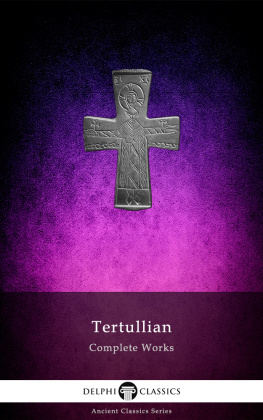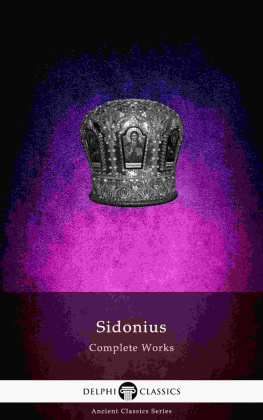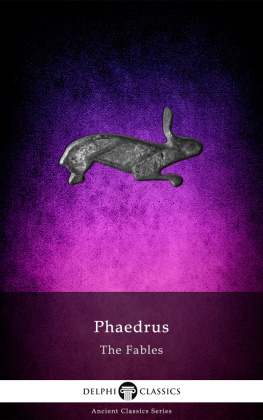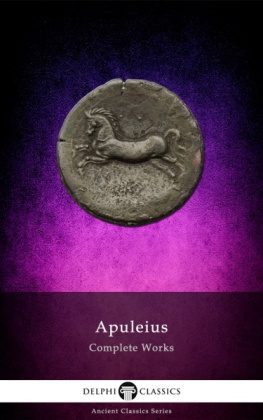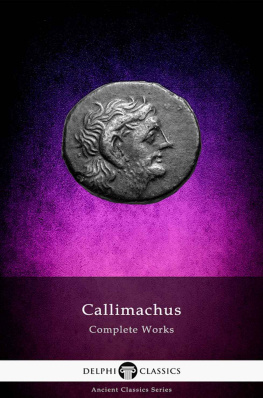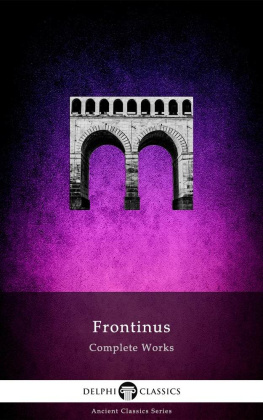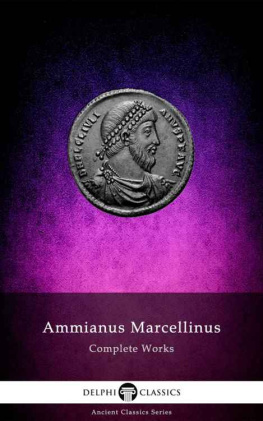
The Complete Works of
TERTULLIAN
(c. 155c. 240 AD)

Contents

Delphi Classics 2018
Version 1

Browse Ancient Classics







The Complete Works of
TERTULLIAN

By Delphi Classics, 2018
COPYRIGHT
Complete Works of Tertullian
First published in the United Kingdom in 2018 by Delphi Classics.
Delphi Classics, 2018.
All rights reserved. No part of this publication may be reproduced, stored in a retrieval system, or transmitted, in any form or by any means, without the prior permission in writing of the publisher, nor be otherwise circulated in any form other than that in which it is published.
ISBN: 978 1 78877 923 4
Delphi Classics
is an imprint of
Delphi Publishing Ltd
Hastings, East Sussex
United Kingdom
Contact: sales@delphiclassics.com

www.delphiclassics.com
The Translations

Roman ruins at Carthage, modern-day Tunis, Tunisia Tertullians birthplace
Introductory Note by Peter Holmes

From Ante-Nicene Fathers, Volume III: Latin Christianity: Its Founder, Tertullian
W HEN OUR LORD repulsed the woman of Canaan (Matt. xv. 22) with apparent harshness, he applied to her people the epithet dogs , with which the children of Israel had thought it piety to reproach them. When He accepted her faith and caused it to be recorded for our learning, He did something more: He reversed the curse of the Canaanite and showed that the Church was designed for all people; Catholic alike for all time and for all sorts and conditions of men.
Thus the North-African Church was loved before it was born: the Good Shepherd was gently leading those that were with young. Here was the charter of those Christians to be a Church, who then were Canaanites in the land of their father Ham. It is remarkable indeed that among these pilgrims and strangers to the West the first elements of Latin Christianity come into view. Even at the close of the Second Century the Church in Rome is an inconsiderable, though prominent, member of the great confederation of Christian Churches which has its chief seats in Alexandria and Antioch, and of which the entire Literature is Greek. It is an African presbyter who takes from Latin Christendom the reproach of theological and literary barrenness and begins the great work in which, upon his foundations, Cyprian and Augustine built up, with incomparable genius, that Carthaginian School of Christian thought by which Latin Theology was dominated for centuries. It is important to note (1.) that providentially not one of these illustrious doctors died in Communion with the Roman See, pure though it was and venerable at that time; and (2.) that to the works of Augustine the Reformation in Germany and Continental Europe was largely due; while (3.) the specialties of the Anglican Reformation were, in like proportion, due to the writings of Tertullian and Cyprian. The hinges of great and controlling destinies for Western Europe and our own America are to be found in the period we are now approaching.
The merest school-boy knows much of the history of Carthage, and how the North Africans became Roman citizens. How they became Christians is not so clear. A melancholy destiny has enveloped Carthage from the outset, and its glory and greatness as a Christian See were transient indeed. It blazed out all at once in Tertullian, after about a century of missionary labours had been exerted upon its creation: and having given a Minucius Felix, an Arnobius and a Lactantius to adorn the earliest period of Western Ecclesiastical learning, in addition to its nobler luminaries, it rapidly declined. At the beginning of the Third Century, at a council presided over by Agrippinus, Bishop of Carthage, there were present not less than seventy bishops of the Province. A period of cruel persecutions followed, and the African Church received a baptism of blood.
Tertullian was born a heathen, and seems to have been educated at Rome, where he probably practiced as a jurisconsult. We may, perhaps, adopt most of the ideas of Allix, as conjecturally probable, and assign his birth to a.d. 145. He became a Christian about 185, and a presbyter about 190. The period of his strict orthodoxy very nearly expires with the century. He lived to an extreme old age, and some suppose even till a.d. 240. More probably we must adopt the date preferred by recent writers, a.d. 220.
It seems to be the fashion to treat of Tertullian as a Montanist, and only incidentally to celebrate his services to the Catholic Orthodoxy of Western Christendom. Were I his biographer I should reverse this course, as a mere act of justice, to say nothing of gratitude to a man of splendid intellect, to whom the filial spirit of Cyprian accorded the loving tribute of a disciple, and whose genius stamped itself upon the very words of Latin theology, and prepared the language for the labours of a Jerome. In creating the Vulgate, and so lifting the Western Churches into a position of intellectual equality with the East, the latter as well as St. Augustine himself were debtors to Tertullian in a degree not to be estimated by any other than the Providential Mind that inspired his brilliant career as a Christian.
In speaking of Tatian I laid the base for what I wished to say of Tertullian. Let God only be their judge; let us gratefully recognize the debt we owe to them. Let us read them, as we read the works of King Solomon. We must, indeed, approve of the discipline of the Primitive Age, which allowed of no compromises. The Church was struggling for existence, and could not permit any man to become her master. The more brilliant the intellect, the more dangerous to the poor Church were its perversions of her Testimony. Before the heathen tribunals, and in the market-places, it would not answer to let Christianity appear double-tongued. The orthodoxy of the Church, not less than her children, was undergoing an ordeal of fire. It seems a miracle that her Testimony preserved its unity, and that heresy was branded as such by the instinct of the Faithful. Poor Tertullian was cut off by his own act. The weeping Church might bewail him as David mourned for Absalom, but like David, she could not give the Ark of God into other hands than those of the loyal and the true. I have set the writings of Tertullian in a natural and logical order, so as to aid the student, and to relieve him from the distractions of such an arrangement as one finds in Oehlers edition. Valuable as it is, the practical use of it is irritating and confusing. The reader of that edition may turn to the slightly differing schemes of Neander and Kaye, for a theoretical order of the works; but here he will find a classification which will aid his inquiries. He will find, first, those works which connect with the Apologists of the former volumes of this series: which illustrate the Churchs position toward the outside world, the Jews as well as the Gentiles. Next come those works which contend with internal differences and heresies. And then, those which reflect the morals and manners of Christians. These are classed with some reference to their degrees of freedom from the Montanistic taint, and are followed, last of all, by the few tracts which belong to the melancholy period of his lapse, and are directed against the Churchs orthodoxy.
Next page
